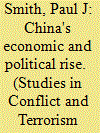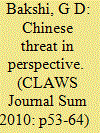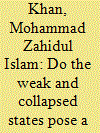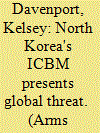| Srl | Item |
| 1 |
ID:
090202


|
|
|
|
|
| Publication |
2009.
|
| Summary/Abstract |
As a rising power in the international system, China is discovering that, like many states before it, the ascendancy to great power status sometimes entails significant terrorism risks. Recent attacks against Chinese nationals (or commercial interests) in Africa, Central Asia, and South Asia appear to reflect this trend. In addition, since the early 1990s, China has endured a series of violent attacks emanating from (or associated with) its restive northwest Xinjiang Uighur Autonomous Region (XUAR). Beijing's search for energy security and its associated commercial activities in the Middle East, Africa, South Asia and Central Asia suggests that terrorism risks for China may increase in the future. In the wake of the 9/11 attacks in the United States and U.S.-Chinese counterterrorism cooperation prior to and during the 2008 Olympic Games, Washington and Beijing have discovered they have many common interests in countering the global threat of terrorism. However, for long-term cooperation to be sustained, the two countries must overcome or manage various disagreements on issues related to terrorism and the larger challenges associated with geopolitical competition. If these differences can be mitigated or resolved, China and the United States may be ideally positioned to establish a powerful and long-term bulwark against international terrorism and the instability that it promotes.
|
|
|
|
|
|
|
|
|
|
|
|
|
|
|
|
| 2 |
ID:
096805


|
|
|
| 3 |
ID:
134112


|
|
|
|
|
| Publication |
2014.
|
| Summary/Abstract |
Weak and collapsed states are portrayed as the primary global threat to security so frequently by the politicians, journalists and policy makers that it has almost become a reality. Yet, this seemingly universalised and undertheorised concept bears a different meaning to each actors and demands critical examination. From an international relations perspective, this paper examines the extent to which the weak and collapsed states challenge the realist account of maintaining world order. Conceptualising state weakness, this paper outlines the key realist assumptions to contrast those in weak states' context. Highlighting the realists underpinning that the structure of international system is resilient, the paper concludes that the concept of weak and collapsed states is a political construction and such states do not constitute a critical mass challenging the essential continuity of international order. International system is still dominated by powerful states and the opportunity for weak states to graduate upward under a resilient international system tends to outweigh the forces of weak and collapsed states, keeping the realist account of world order undaunted.
|
|
|
|
|
|
|
|
|
|
|
|
|
|
|
|
| 4 |
ID:
150613


|
|
|
|
|
| Summary/Abstract |
The problem of finding agreement on a universal definition on terrorism is, at this stage, more a political than a legal or semantic problem. In a way, more than two thirds of all Member States of the UN have already not accepted a common definition. The latest report on the UN web is of 2011. The progress is unsatisfactory. Members of various political hues are still divided over what could be the exact definition of terrorism. This diversity of opinion and multipolarity of the term itself are major reasons of disagreement.
|
|
|
|
|
|
|
|
|
|
|
|
|
|
|
|
| 5 |
ID:
133509


|
|
|
|
|
| Publication |
2014.
|
| Summary/Abstract |
This article seeks to determine the mechanism(s) behind the convergence of domestic counterterrorism regulations that has been noted across many Organisation for Economic Co-operation and Development (OECD) countries. Four hypotheses are developed and tested through regression analyses. These hypotheses examine (1) U.S. influence, operationalized though a unique U.S. footprint indicator; (2) national characteristics; (3) the extent to which states' domestic structures match; and (4) international networks. We find little support that U.S. influence matters. The international influence that does exist seems to operate through networks promoting learning, especially following a rise in the general global threat level. National characteristics as a driver also find some support.
|
|
|
|
|
|
|
|
|
|
|
|
|
|
|
|
| 6 |
ID:
154215


|
|
|